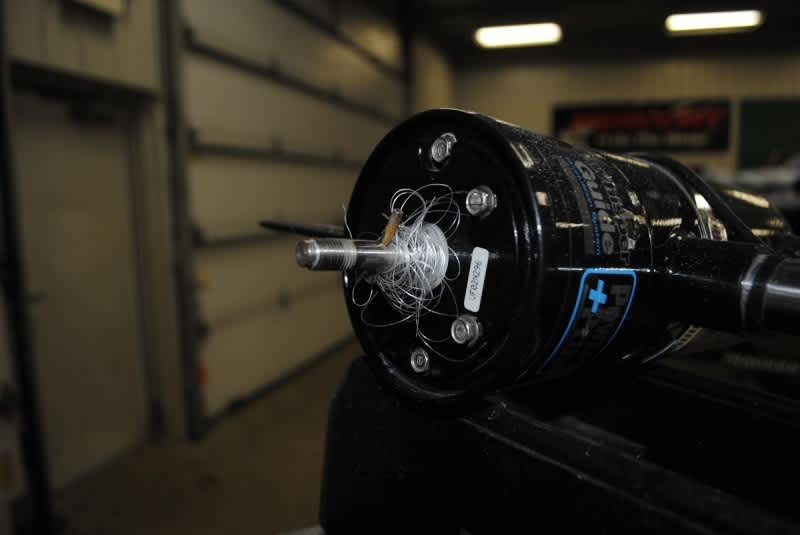Prepping for Michigan’s Unofficial Fishing Season Opener
Bob Gwizdz 04.24.14

The last Saturday in April is the unofficial opening day for fishing season in Michigan, as it is the official opening day for walleye, pike, and muskellunge in inland waters of the Lower Peninsula; the opening day for catch-and-release bass fishing in the Great Lakes and connecting waters as well as the inland waters of the Lower Peninsula; and the statewide opener for trout for steams with closed seasons.
Did you get all that?
Spring seems to be a couple of weeks behind—many northern Lower Peninsula waters still have ice—and water temperatures are below where they usually are this time of year. Still, it’s a safe bet that plenty of anglers will be on their favorite waters this weekend and it’s also a safe bet that it’ll be the first time that many put their boat in the water for the season.
If you’d had the joy of waiting in a long line on a popular boat ramp for the opener, you’ve no doubt witnessed plenty of guys who unload their boat, then spend a half hour trying to get the outboard to fire up, slowing down the launch process and shortening tempers. It happens every year.

So don’t be that guy; either give your rig the once over or take it to the marine dealer before you hit the launch ramp.
Begin with the fuel system; if you have gas in the tanks that was not stabilized before you put your boat up for the winter, get rid of it. Don’t just drain it out on the ground or into the sewer, dispose of it properly. I always empty it into my truck, but if it’s been there for a long time, that may not be a good idea.
With ethanol in virtually all gas these days—you can still get pure gasoline at marinas—there are attendant problems. Ethanol is hard on rubber parts (fuel lines, primer bulbs) and though manufacturers have done a good job in addressing this issue in recent years, rubber parts on older models are subject breaking down.
“I’ll bet we went through 2,000 feet of fuel line and 200 primer bulbs last year,” said Jason Romig, the service manager at D&R Sports Center in Kalamazoo.
Check fuel lines and primer bulbs for cracks or leaks. If they appear sound, fire up the engine, either with a set of muffs connected to a water hose or in a barrel. Make sure the water pump is functioning properly (Romig recommended replacing the impellor every two or three years) and let the outboard run until it warms up. D&R mechanic Adam Silsbee advocated running the engine with the cowl off and holding on to the thermostat housing to make sure it’s heating up. Sometime sand gets in the thermostat, causing it to malfunction, he said.
If the outboard is missing or running poorly, it’s tune-up time—and when was the last time you changed plugs or the fuel filter?
Remove the prop from both your outboard and trolling motor and make sure there’s no fishing line around the spindle (to prevent damaging seals) and no signs of uneven or unusual wear. Silsbee said it’s a good practice to replace the cotter pin on your outboard prop every year as bending and removing it makes its brittle and subject to breaking.
Check your lights—both on the boat and the trailer. Often, if they aren’t working, it’s often just matter of cleaning up the contacts.

Jack up your trailer and spin the wheels, checking for bearing issues. If the tires spin smoothly and there’s no noise, lube your bearings.
“Bearings can go out at any time,” Silsbee said. “You want to catch it before it strands you on the side of the road.”
If your trailer has brakes, check the pads for wear and the brake fluid.
Make sure your batteries are charged and your connections are solid and clean. “Make sure the batteries are secure so they’re not bouncing around,” Silsbee continued. Check your electronics. Make sure your bilge pump is operating. Make sure the electrical connection to your vehicle is good, too.
Check your tire pressure (most boat trailers tires run 40 to 50 pounds of pressure). Check your spare tire, and make sure you have an appropriate jack and tire tool. Check your safety equipment (anchor, anchor rope, horn or other sounding device, personal floatation devices, a throw-able device, and so on).
Make sure your winch post is secure on the trailer frame and the winch rope or strap is in good shape.
Give all bolts and screws—holding everything from your outboard to your trolling motor to the line cleats—the once-over to make sure they are secure. Check for spare parts (bulbs, fuses, et cetera).
Nothing ruins a day’s fishing more thoroughly than boat and motor problems. Be ready.
And catch a bunch.
For more information on Michigan fishing go to michigan.org. Click here to purchase a Michigan fishing license online.
This article was produced in partnership with Pure Michigan.

